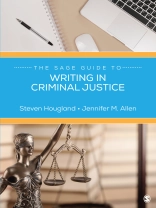‘
The SAGE Guide to Writing in Criminal Justice provides students studying crime with a ‘how-to’ manual for effective writing in institutions of higher learning, professional settings, public and private agencies, and beyond. It is an easy, accessible resource for anyone hoping to learn the nuts and bolts of writing for criminal justice audiences.’
—Christina Mancini,
Virginia Commonwealth University,
Wilder School of Government and Public Affairs
The SAGE Guide to Writing in Criminal Justice equips students with transferable writing skills that can be applied across the field of criminal justice—both academically and professionally. Authors Steven Hougland and Jennifer M. Allen interweave professional and applied writing, academic writing, and information literacy, with the result being a stronger, more confident report writer and student in criminal justice. Students are also exposed to a number of best practices for academic and professional writing, such as research papers, resumes and cover letters, and report writing. The perfect companion for any introductory criminal justice course, this brief text focuses on key topics that will benefit students in their classes and in the field.
表中的内容
Preface
Acknowledgments
About the Authors
Chapter 1: The Basics of Writing
Basic Grammar Rules
Critical Thinking Skills, Academic Writing, and Professional Writing
Writing for Criminal Justice Professions
Policing Reports
Corrections Reports
Probation/Parole Reports
Court Reports
Chapter 2: What Is Information Literacy?
Information Literacy
Digital Literacy, Computer Literacy, and Technology Literacy Skills
Chapter 3: Writing in Criminal Justice
Basic Writing Tools
Field Notes
Point of View
Writing the Narrative
Writing Styles
Examples of Poorly Written Incident Reports
The SAGE Way
Eliminate Slang and Jargon
Eliminate Emotion
Answer the Interrogatives
Editing
Chapter 4: Other Documents: Memos, Letters, Emails, Cover Letters, and Resumes
Writing Business-Related Documents
Memos
Letters
Emails
Cover Letters and Resumes
Chapter 5: Academic Paper Formats: What Is APA Formatting?
Research, Publication, and the APA Style Rules
APA Formatting and Ethical and Legal Standards
Modern Language Association and the Chicago Manual of Style
Chapter 6: The Academic Research Paper
The Research Writing Process
Conducting Research
Locating Sources
Google Scholar
Use Country Codes
Use Databases
Evaluating Sources
How to Read a Scholarly Article
Writing a Literature Review
Writing the Essay
Working and Annotated Bibliographies
Appendix: Sample Student Essay
References
关于作者
Jennifer M. Allen is a professor in the School of Criminal Justice at Nova Southeastern University and former department head of the Department of Criminal Justice at the University of North Georgia. She has worked with juveniles in detention, on probation, and with those victimized by abuse and neglect. Dr. Allen has served on advisory boards for Big Brother/Big Sister mentoring programs, Rainbow Children’s Home, domestic violence/sexual assault programs, and teen courts. Dr. Allen has published in the areas of restorative justice, juvenile delinquency and justice, youth programming, police crime, and policing administration and ethics. She is also the coauthor of Criminal Justice Administration: A Service Quality Approach; The SAGE Guide to Writing in Criminal Justice; The SAGE Guide to Writing in Research Methods; The SAGE Guide to Writing in Corrections; and The SAGE Guide to Writing in Policing.












